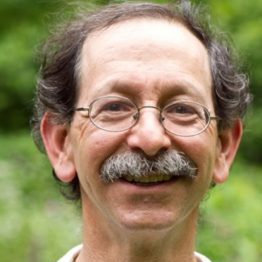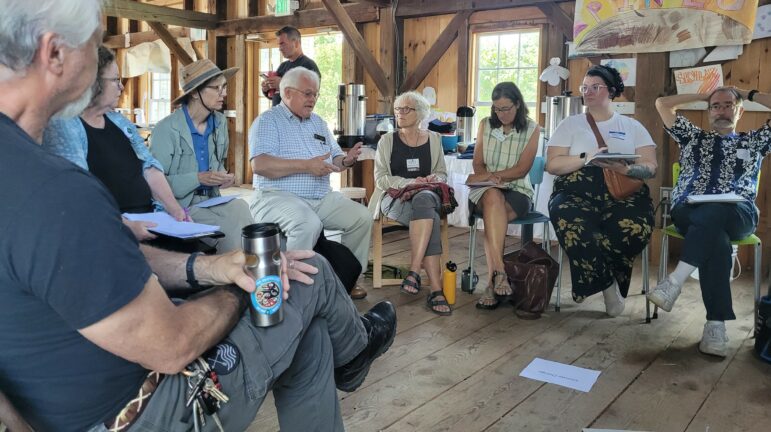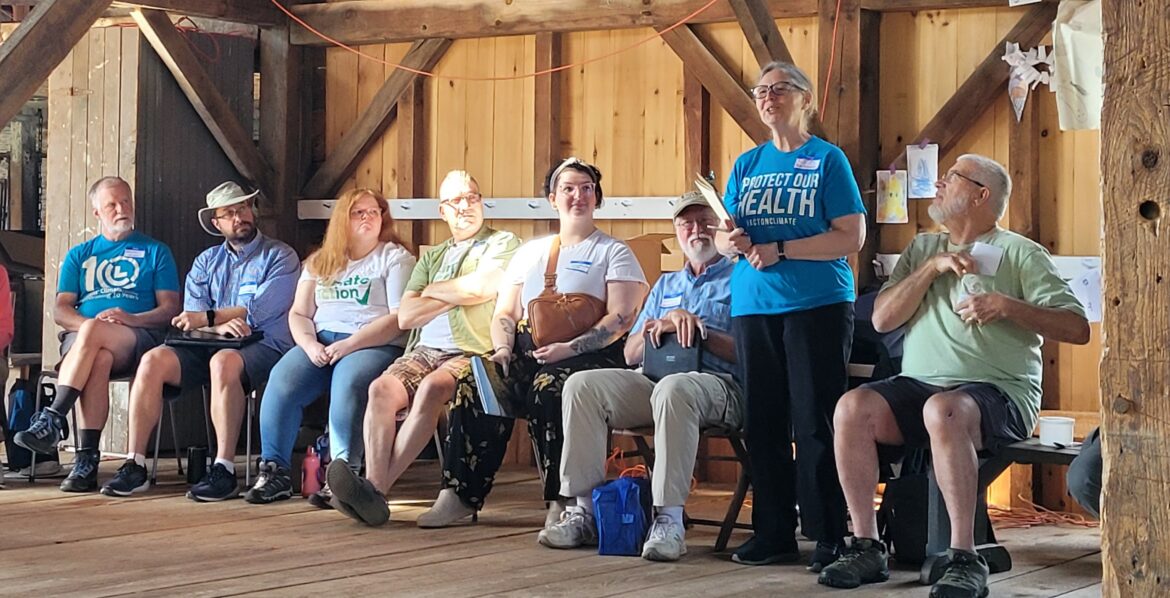
Arnie Alpert spent decades as a community organizer/educator in NH movements for social justice and peace. Officially retired since 2020, he keeps his hands (and feet) in the activist world while writing about past and present social movements.

Above, Rep. Chuck Grassie, D-Rochester is pictured at a break out group Saturday in Laconia. ARNIE ALPERT photo
By Arnie Alpert, Active with the Activists
LACONIA — “I’m from Cornish Flat, New Hampshire, near Claremont and Lebanon, and my environmental concern is single use plastic waste and pollution in our state.”
So began the introductions at the Keep New Hampshire Green Environmental Summit Saturday morning and on they went for most of an hour. “I’m a science teacher and an environmental advocate and I’m interested in environmental health and water quality.”
“The mission of our organization is to eliminate greenhouse gas emissions from our region.” “I’m a retired person who has been drawn into a fight to stop a landfill.” “I’m serving my first term in the House. It’s been quite an education.”
By the time the 66th person introduced herself (a recently retired EPA employee who said she’s been involved in environmental campaigns since she was 6 years old), the summit was already a success.
“Our hope is that people who are very active in environment in New Hampshire talk to each other so that our voices are not splintered,” Susan Richmond, one of the event’s organizers, told me before the meeting.
Jon Swan of Save Forest Lake, which has been fighting a North Country landfill, led off the event, saying, “The whole point of this meeting is just to find new friends and allies, to meet in person, help each other out with our respective fights.”
The gathering was organized by the New Hampshire Network for Environment, Energy, and Climate, a group formed just two years ago. Its purpose, according to the group’s website, is “to facilitate communication among groups concerned about New Hampshire’s environment, energy future, and climate.” Meeting in a post-and-beam style barn at the Prescott Farm Environmental Education Center in Laconia, participants came prepared to talk and learn about energy, climate, plastics, PFAS, and whatever other environmental issues arose. With solid waste on their minds, organizers had instructed participants to bring their own non-disposable name tags and coffee cups. Swan also brought cookies and joked they could be composted if any were left at the end of the meeting.
“What are the problems? What are the solutions?” he asked before the participants scattered into breakout groups. “You guys are all smart, I bet you can find some solutions. What do we need to do?”
The clean energy group said they were all about solutions, including helping municipalities get on board with community power and take advantage of incentives that are available through the federal Inflation Reduction Act. “This is the season to be getting warrant articles in place for your town meetings,” Bill Coder said.
“This is short and sweet,” Coder continued, “but clean energy is cheaper energy. The message there is a strictly nonpartisan one.” To get the public behind clean energy, he said, advocates should “incentivize the public on the basis of economics and achieve cleaner energy. You don’t have to beat people over the head to say this is all about climate.”
While the NH Network is formally non-partisan, the discussion was decidedly not. Representative Chuck Grassie, a Democrat from Rochester, held up a hand in the climate breakout group and said, “I probably have more fingers than there are Republican representatives who support climate change action.”
“There is money right now in the budget to update the Climate Action Plan, but they can’t really do anything with the current governor in office,” he said at the meeting’s close. “The governor is saying that they can’t even use the word ‘climate action’ in state documents.”
Instead of trying to persuade the governor, Grassie is working on a proposal to amend the State Development Plan, something the legislature is supposed to do every four years. His proposal, drafts of which circulated at the summit, takes a vaguely worded statute on natural resources and adds specific language about environmental protection and “the cumulative effects of natural and man-made contaminants.”
An upcoming special State Representative election in Nottingham and Northwood has the attention of the green groups, which clearly hope for a Democratic win that could even up the party composition of the NH House at 199 Republicans and 199 Democrats. Judy Elliott, a member of Canterbury Citizens for Democracy, urged those present to get out and canvass on behalf of the Democratic candidate, Hal Rafter.
Other changes might be longer term. Jon Swan and Wayne Morrison, both of whom have been involved in the ongoing campaign to block the Casella Corporation’s plan for a new landfill in Dalton, say the dangers of landfills are greatly increased by waste imported into New Hampshire by private companies. “We just need to take the privatization for profit out of waste to treat it more as a utility,” Swan offered. “That’s the solution in New Hampshire.”
For Morrison, who has homes in Mont Vernon and Whitefield, it’s a social justice issue. “My wife and I have gotten all the benefits of a beautiful lake and clean air and clean water. It’s about the next generations,” he said. “And if we don’t do something now, those generations are going to pay the price for this short-sighted lack of strategy that we have in the state of New Hampshire.”
When the meeting ended at about noon, Morrison said he was glad to have met up with people involved in a range of environmental struggles. “I think when you are involved in one of these fights, you get very focused on your own issue,” he said. The summit showed him that the North Country groups fighting the landfill are not alone and that there’s power in sharing stories. “We can learn from each other and maybe empower each other and maybe accelerate some of the progress we need to make,” Morrison said.
While just about everyone was involved at the grassroots level in their own communities, many of the participants were connected to statewide or national groups, including the Citizens Climate Lobby, League of Conservation Voters, Sierra Club, 350NH and the Appalachian Mountain Club. Others were associated with conservation commissions, Unitarian Universalist churches, local energy committees, and a group called Healthcare Workers for Climate Action. At least five State Representatives were present. All ten counties were represented, though rural and suburban communities had better representation than the state’s urban areas. The demographics skewed toward older white folks.
Some people who hoped to attend were missing. “Two of our Merrimack water warriors were going to be here today. Both had to back down and they couldn’t attend because of health issues,” announced the reporter from the PFAS breakout group.
Anne Fenn, the retired EPA worker, said she ran for State Representative in Londonderry and lost, but may run again out of concern for the climate. The ocean temperature in Kennebunkport, Maine was 70 degrees, she said, during a recent trip she took to the beach. She rejected the idea that talking about climate is too polarizing, but said people may need to be personally affected before it sinks in. “I am amazed that anybody is blind to it at this point,” she said.
The meeting was “fantastic,” Nick Paul from Clean Energy NH said. In New Hampshire, there’s “a unique opportunity to influence policy at the State House. It’s at state agencies and regulatory bodies that folks in other states simply don’t have those opportunities. So, the people power in this building is energizing.”
Reb MacKenzie of Claremont, who calls herself an advocate, not an activist, said the Green Summit met its goals. “I have been thinking for a long time about the importance of getting a broad variety of folks that are interested in environmental issues together. Because I think these different things we talked about today are all related,” she said when the meeting ended. “We are advocates for our health, our wellness, and for the future generations, and we need to make it happen to deal with the climate issues,” she said.
Jon Swan reported that all the cookies were eaten. He went home with one banana peel for his compost pile.






